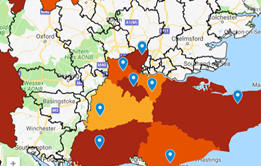- Number of CCGs will fall by a third if proposed mergers go ahead
- Would be NHS’ biggest consolidation since PCTs halved in 2006
- Concerns over destabilised finances and upheaval of STP/ICS footprints
Nearly half of clinical commissioning groups are proposing to merge next year in what would be the biggest cull of NHS organisations for more than a decade, HSJ can reveal.
Analysis by HSJ has identified 86 CCGs which have confirmed or are consulting over consolidations by next April – 45 per cent of the current 191 groups.
It would mean the number falling by a third to 126 if all those considering mergers go ahead with applications, and they are approved by NHS England.
That would be the largest set of full NHS mergers in one year since 2006 when the number of primary care trusts was halved from 303.
Andrew Lansley’s huge NHS reorganisation in 2013 saw about 150 primary care trusts, grouped into about 50 PCT clusters, abolished – but these were replaced by 211 CCGs, and by NHS England.
Between 2013 and this year – despite many NHS leaders and commentators proposing CCG mergers – there has been a reduction of only 20 groups (9.5 per cent).
Four areas – Bradford, North Yorkshire, Nottingham and Nottinghamshire, and Shropshire – have so far formally agreed to apply to merge.
A further 17 areas are planning to make applications if local talks are successful – among them Kent and Medway, Durham and Teesside, Staffordshire and Stoke-on-Trent, and Herefordshire and Worcestershire.
Other CCGs could well join them ahead of a September deadline for 2020 merger proposals.
They all have to be approved by NHSE. The national regulator is encouraging mergers – particularly to help cost-savings and the development of system working – and changed its rules to make it easier to merge. However, sources in some areas said the regulator was still asking for information and approval processes which could make it difficult to meet the September deadline to submit proposals.
London is likely to see the biggest change, if a total of 25 CCGs in the capital become four in April, as is currently proposed by the groups in north west, north central, south east and south west London. A decision over the future of the seven remaining CCGs in the capital, in north east London, is due in the autumn, with a view to creating a fifth large commissioner by 2021.
Money talks
So far the proposals for a huge number of CCG mergers have sparked little vocal opposition.
One issue where concern is being raised in some areas, however, is the financial impact on areas whose CCG is in a relatively healthy position, as they merge with others deep in the red.
In north west London, local officials have raised concerns over the financial consequences of merging eight CCGs where performance is highly variable.
The combined system had an overall deficit of £57m in 2018-19 but Harrow CCG was £42m in the red while West London finished with a £17m surplus.
In a briefing, they said: “Creating a single CCG will raise fears that better funded areas are going to be levelled down, and there will be a loss of local accountability for budgetary decisions.
“We will need to be sensitive to these issues and ensure that good financial management across NW London is not seen as a punishment on some.”
Leaders in this area have said they are expecting regional guidance to ensure consistency over finance decisions. However, these are likely to be fairly informal recommendations.
Similar concerns have been raised in other parts including Telford, where the CCG broke even last year. Local politicians said a planned merger with Shropshire CCG, which ran up a £17m in-year deficit, felt more like a “takeover”.
Richard Vautrey, chair of the British Medical Association’s GP committee, said CCGs merging with those suffering financial problems faced working within a reduced cash envelope.
“That is a concern for those finding themselves saddled with a neighbour’s debt,” he said.
He said the promise of clinically-led CCGs had not been delivered on the whole.
“In some cases, there is a genuine connection with the local community and local practices, and practices do feel they have a voice,” he said.
“But, as these organisations become smaller [in capacity/staffing], more distant and more regionally-based, it’s much harder to maintain that local link.”
Graham Jackson, co-chair of NHS Clinical Commissioners, said merging CCGs needed to learn lessons from others which have already completed them as they tackled “difficult issues”.
“We’ve heard from CCGs who have already been through mergers that it’s important to start thinking with a more strategic perspective – and that some tricky questions can be tackled by asking what is best for the system as a whole,” he said.
NHSE was approached for comment.
The HSJ Integrated Care Summit, taking place at the Hilton Deansgate, Manchester from 19-20 September, unites 150+ senior leaders from across the provider, commissioning and local council landscape to determine how to best capitalise on the new funding settlement to rethink service delivery to improve quality and outcomes for your local population.
Held under the Chatham House Rule, attendees will quiz Simon Stevens, Rosie Benneyworth and other national figures on general policy direction, and co-develop solutions to their local challenges with NHS and local government colleagues from across the country. The Summit is free to attend for senior NHS and public sector figures – register your interest here: https://integratedcare.hsj.co.uk/register-2019
Source
HSJ analysis
Source Date
July 2019
Mapped: Sweeping CCG mergers planned for next year

HSJ’s map shows the 86 clinical commissioning groups proposing mergers in 2020, in what looks set to be the largest NHS consolidation for more than a decade.
- 1
 Currently
reading
Currently
reading
Revealed: Nearly half of CCGs planning mergers for 2020





























1 Readers' comment